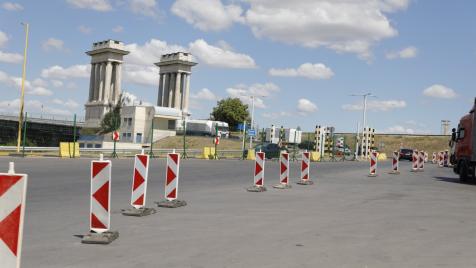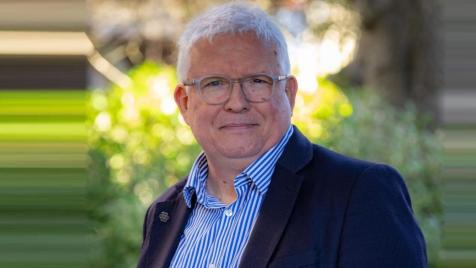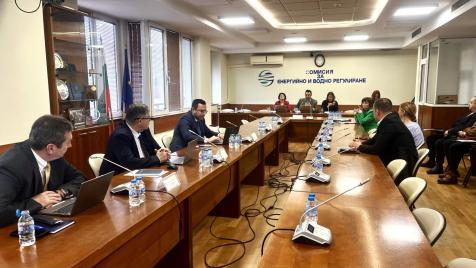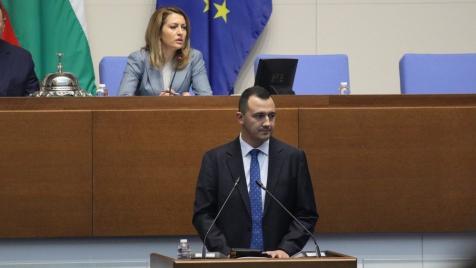Fact check: Did the EPP really kill the Green Deal?
A statement of the European People's Party published on January 18 stirred up the spirits, and many media outlets used it to come out with loud and misleading headlines
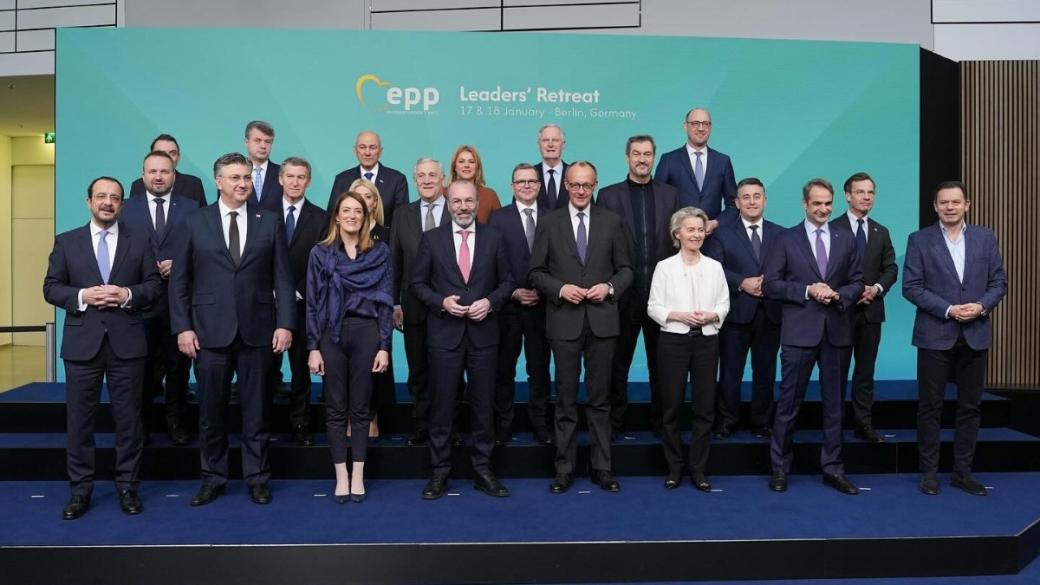
© ECONOMIC.BG / EPP/ Facebook
“The end of the Green Deal is approaching!”, “EPP is ready to “kill” the Green Deal”, “EPP with a declaration that practically cancels the Green Deal”, “The Green Deal has been put in question”, “EPP with a declaration calling to cancel almost everything under the European Green Deal”, “EPP erupted against the Brussels bureaucracy”. These are just some of the headlines that the Bulgarian media outlets published regarding a statement of the European People’s Party published on January 18, following a meeting of the party leaders in Berlin.
The various news articles claim that the EPP is pushing for a revision, and some publications even mention a complete repeal of the Green Deal. In essence, however, the main focus of the party’s position is on Europe’s competitiveness and unnecessary bureaucracy for small and medium-sized enterprises. Moreover, it is explicitly stated that the EPP welcomes the EC’s plans to transform the Green Deal into a Clean Industrial Deal in a way that addresses concerns about Europe’s competitive advantage over China and the US.
How did it all begin?
In a Facebook post on January 22 - 4 days after the EPP statement - Boyan Rashev, an environmental and energy management expert, wrote that “the end of the Green Deal is approaching,” adding that the leading political party in the European Parliament is finally realizing how destructive the impact of this policy has been on the Union. Rashev lists several proposals that, in his opinion, are embedded in the EPP position.
He used a screenshot of a Euractiv article that briefly described how to stimulate the EU’s struggling economy, the adopted targets for renewable energy sources would have to be scrapped and the rules for companies’ reporting would have to be revised. His post was then shared by media outlets that copied what he wrote on Facebook almost verbatim, probably without even reading the actual statement, which is prominently displayed on the EPP website.
What is the truth?
In the current composition of the European Parliament, the political group of the European People's Party is the largest, consisting of 188 members. However, it should be borne in mind that the EPP statement was disseminated on the occasion of a leaders' meeting organized in Berlin. For the moment, nothing that is embedded in that statement has been officially proposed to the European institutions. Another important detail is that the members of the EPP are some of the most influential politicians in some of the strongest economies in Europe, such as Germany. This goes to show that it is quite normal for the political group to come up with an assertive position when it comes to the competitiveness of Europe on the global stage.
Essentially, the EPP statement consists of 3 pages, which Rashev and the media that copied his post, have interpreted with a different meaning. In order to make it clear what exactly the EPP is saying with its statement, the document must be read in its entirety.
Let’s examine each point made by Rashev in his Facebook post.
- Postponement of the CSRD and the Supply Chain Due Diligence Directive (CSDDD) by at least 2 years. Their application will be limited to companies with over 1,000 employees.
The EPP points out that the Corporate Sustainability Directive (CSRD) and the Corporate Sustainability Due Diligence Directive (CSDDD) actually make life harder for small and medium-sized companies. That is why it says that the implementation of these directives, as well as the Carbon Border Adjustment Mechanism (CBAM), should be postponed for at least two years.
However, there is no indication that the directives should be completely abolished. Moreover, during the two years of postponement, the EPP points out that a general regulation on the subject should be adopted, which would apply only to the largest companies, so as to reduce the bureaucratic burden on small and medium-sized businesses.
This would create legal certainty for all companies affected while reducing the bureaucratic burden in the long term,” says the statement.
It is worth mentioning here that the bureaucratic burden is a topic that is yet to be discussed in the European institutions, not only in relation to the Green Deal but in its entirety. Thus, in practice, the EPP's position is actually in line with the new views of the EU.
- Postponement of the introduction of carbon tariffs (CBAM) by at least 2 years.
The Carbon Border Adjustment Mechanism (CBAM) is mentioned in the document in two places. The first time, in fact, it is mentioned on par with the above directives when the topic is that of postponement. In the second place, the statement says that its effects should be carefully assessed. Specifically, it “has to be scrutinized regarding its effects on red tape and the competitiveness of the different sectors of our economy.”
Nowhere does it say that it should be dropped completely.
- Further easing of the already postponed Deforestation Directive (EU DR).
The directive is mentioned only once in the document, where the topic is about the bureaucratic burden in agriculture and forestry. The statement mentions that the EPP is pushing for “further simplification on issues such as set-asides or pesticides as well as for implementing the EU Deforestation regulation.”
In essence, however, there is talk of postponement of the directive, but only a simplification of the measures and norms contained in it.
- Introducing real impact assessments for any new legislation to prevent the adoption of laws that destroy European competitiveness.
Impact assessments are mentioned in one place in the EPP statement, which also touches on another EU procedure not so well known to the public, namely the so-called "trilogue".
In the context of the EU's ordinary legislative procedure, a trilogue is an informal interinstitutional negotiation that brings together representatives of the European Parliament, the Council of the European Union and the European Commission. The aim is to reach a provisional agreement on a legislative proposal that is acceptable to both the Parliament and the Council, which are the co-legislators. This provisional agreement must then be adopted through the formal procedures of each of these institutions.
A trilogue can be held at any stage of the legislative procedure to resolve outstanding issues and is chaired by the co-legislator hosting the meeting. The Commission's role is to mediate between the parties.
On this occasion, the EPP position states that
Robust impact assessments must be carried out before any regulatory proposal is made. Trilogue procedures must be reformed in view of creating greater transparency and democratic accountability including of targeted impact assessments of amendments in the legislative process."
- Cancellation of mandatory quotas for the share of renewable energy in the energy sector. This paves the way for nuclear energy and other low-emission technologies.
- Cancellation of fines for failure to meet average carbon emissions targets for cars sold by all car manufacturers.
- Cancellation of the obligation to renovate buildings that do not meet the criteria for zero net emissions.
These three points are actually linked and mentioned in a general context in the EPP statement when it talks about the EU Emissions Trading System (ETS). However, the word “cancellation” does not appear anywhere, and instead, there is talk about reducing excessive regulation. Moreover, the statement says that the system in question is actually “working and achieving its goals”. Regarding the share of renewable energy, the EPP says that member states should have the power to decide for themselves which technologies they want to use to achieve their climate goals but nowhere is there any mention of cancellation or repeal.
Regarding fines for the automotive industry, it should be borne in mind that this is about easing measures, not repealing them. As for mandatory housing renovation, the statement says that there is no need for additional excessive regulation, but again, there is no mention of cancellation.
In response to high energy prices a larger share of ETS revenues should be earmarked to energy-intensive industries, for example, to support green hydrogen or carbon capture and storage solutions,” says the statement.
It is hydrogen that will play a major role in the EU's new Clean Industrial Deal, so it can be said that once again the EPP's position is in line with already adopted policies.
- Ending the practice of further complicating environmental regulations at the national level.
This refers to the so-called gold-plating – a process in which the powers of an EU directive are expanded when it is transposed into the national legislation of a member state.
In a study related to the European Agricultural Fund for Rural Development, the European Commission identifies gold-plating as a source of obstacles to achieving policy objectives, defining it as “an excess of norms, guidelines and procedures accumulated at the national, regional and local level that hinder the expected policy results set out in the given regulation.”
The EPP points out that "EU directives should not go beyond a 1:1 implementation at the national level but should be limited to the minimum level of regulation envisaged. Parallel regulation at European and national level should be avoided wherever possible."
The conclusions
However, the biggest proof that the EPP is not giving any signals that it wants to "kill" the Green Deal is in the last paragraph of its statement, which says
We welcome the Commission's plan for a ‘Clean Industrial Deal’ which should address these concerns and give a clear signal that Europe will tackle its competitiveness and productivity problem with a more pragmatic approach.”
In practice, the EPP points out different aspects of the Green Deal and the need for their transformation, so as to protect the competitiveness of small and medium-sized businesses in Europe. The new ‘Clean Industrial Deal’ has already been presented by the President of the European Commission, Ursula von der Leyen, who herself is part of the EPP Group. Thus, last year it already became clear that there would be an update of the Green Deal.
In this context, the EPP's position is not a surprise. It can be said that it advocates basic points that Von der Leyen has already mentioned.
In summary, many media publications have presented the EPP statement in a way that does not reflect the exact context. A look at international media outlets shows that no respectable publications are talking about the EPP killing the Green Deal. Euronews, for example, focuses specifically on the topics of competitiveness and migration.
Co-Funded by the European Union. Views and opinions expressed are however those of the author(s) only and do not necessarily reflect those of the European Union or the Managing Authority. Neither the European Union nor the Managing Authority can be held responsible for them.
Translated by Tzvetozar Vincent Iolov


 Economic.bg
Economic.bg 